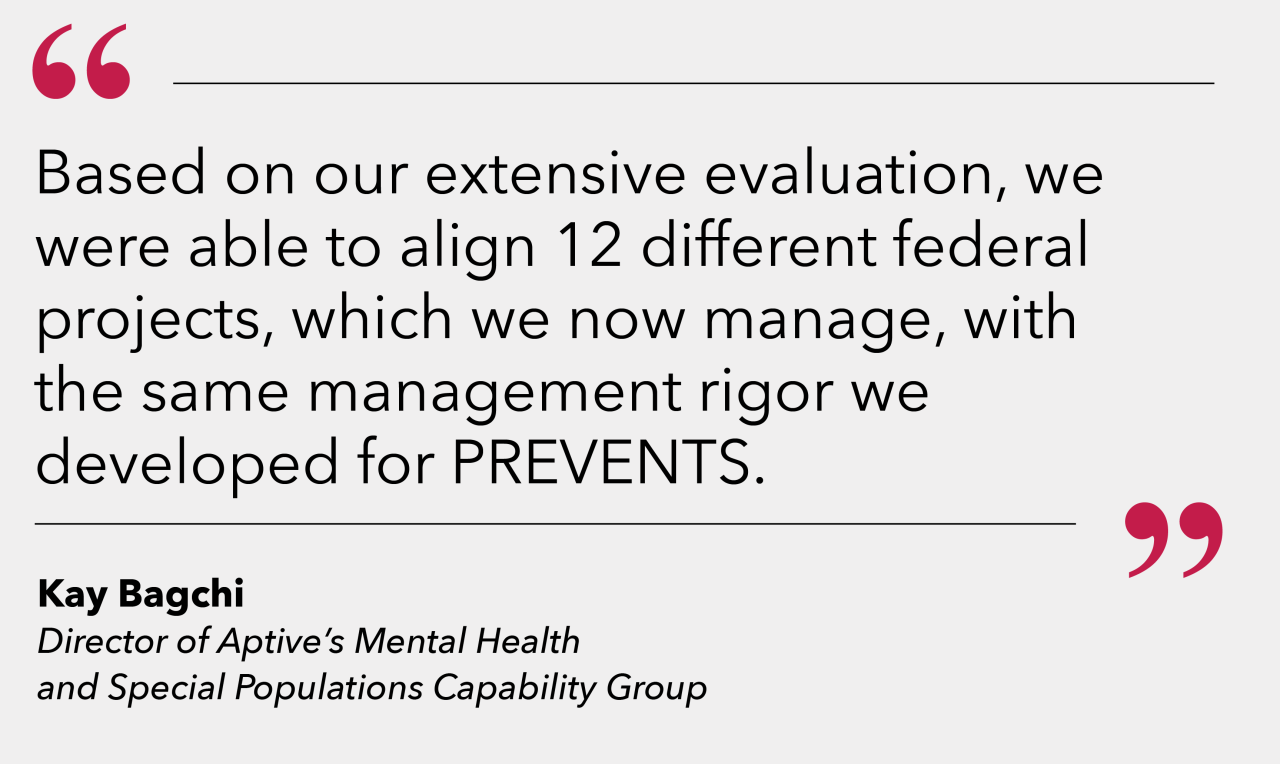Using Data, Community Engagement and Policy to Improve Federal Mental Health and Suicide Prevention Outcomes
Written by Anne Wright

Written by Anne Wright
Big public health problems require a big response. Such is the case with the suicide and mental health crisis in the United States.
Millions of Americans are affected by mental illness and about one person dies by suicide every 11 minutes, according to the U.S. Centers for Disease Control and Prevention. Some groups of people have higher suicide rates than others, including Veterans, American Indian/Alaska Native populations and people who live in rural areas.
For Veterans, the suicide rate was 57.3% higher than that of non-Veteran adults in 2020, the U.S. Department of Veterans Affairs (VA) reported in the 2022 National Veteran Suicide Prevention Annual Report. Suicide was the second leading cause of death among Veterans under age 45 in 2020 and the 13th leading cause of death among Veterans overall, the report found.
Despite numerous public mental health and suicide prevention programs, suicide persists as a serious public health problem. Combating a complex public health issue like suicide requires a multifaceted, multidisciplinary approach that includes data collection and analysis of current suicide prevention programs, community outreach and involvement and policy changes. Working together, behavioral health providers, policy experts, data scientists and program leaders can help create the next generation of mental health programs.

To better address Veteran suicide in particular, the federal government called for a thorough review of current VA mental health and suicide prevention programs and their success and pushed for new, improved ways to address mental health and suicide prevention. Aptive supports VA’s efforts to achieve these objectives through two key programs:
The Clay Hunt Suicide Prevention for American Veterans Act (Clay Hunt Act) requires yearly, independent, third-party evaluations of the impact of VA mental health care and suicide prevention programs. A comprehensive Annual Report to Congress details the entire evaluation process and results, along with recommendations for continuously improving mental health services delivery for Veterans.
A 2019 White House executive order calls for a unified public approach to end Veteran suicide through the President’s Roadmap to Empower Veterans and End a National Tragedy of Suicide (PREVENTS). The goal is to change how the nation addresses mental health and suicide prevention.
While ongoing implementation of PREVENTS and the Clay Hunt Act provides a comprehensive look at the current suicide prevention landscape and how to improve programs and services, VA and Congress are also introducing new initiatives to address the problem.
Collecting and Analyzing Data
Programs are only as good as the data that support them. To get at that data,
“Based on our extensive evaluation, we were able to align 12 different federal projects, which we now manage, with the same management rigor we developed for PREVENTS,” said Kay Bagchi, director of Aptive’s Mental Health and Special Populations Capability Group.
In support of the Clay Hunt Act, Aptive tested data sets for quality, integrity and statistical validity; conducted statistical analyses of program effectiveness; and evaluated cost effectiveness and patient satisfaction. Using quantitative data analysis methodologies and software, Aptive’s research team uncovered deep, evidence-based insights and developed common themes to accurately portray the current state of VA’s suicide prevention programs.
Analyzing both quantitative and qualitative data, Aptive creates a variety of reports each year that evaluate most VA mental health programs; detail Veteran beneficiary demographics and clinical effectiveness; and align interventions, programs and outcomes. The team analyzed research data and generated findings and recommendations for VA and Congress about reorganizing VA’s mental health structure. The Aptive team also introduced a new methodology to cost effectively evaluate VA’s Intensive Community Mental Health Rehabilitation program.

Aptive has expanded its analysis to include telephone and tele-video encounters along with the use of in-person mental health treatment. The team is also involved in tracking and evaluating care for other VA telehealth programs, including tele-pain neuromodulation care and tele-intensive care. This important work helps expand Veterans’ access to high quality, telehealth services including mental health, especially in rural and other areas of the country with health provider shortages.
The findings and insights from Aptive’s evaluations help mental health, suicide prevention and other federal programs better manage resources, improve services and processes and provide accountability for stakeholders.
Engaging Communities
PREVENTS called for the federal government to work with partners from numerous private and nonprofit groups, as well as state, local, territorial and tribal governments, to address suicide from many different perspectives.
“We use our extensive partnership-building experience to forge working relationships at every level of government and with groups outside government,” said Bagchi. “Our team coordinated state visits and hosted townhall meetings, community events and roundtable discussions to build a national coalition with leaders passionate about preventing Veteran suicides.”
All told, the Aptive team worked closely with over 150 subject matter experts from more than 15 federal agencies and many nongovernment organizations, including Veterans Service Organizations and Military Service Organizations, to create the PREVENTS roadmap. The team developed, implemented and evaluated programs, research and policies that yielded 10 general and 154 specific recommendations with 46 federal agency actions.
Aptive applied its evaluation and quality improvement expertise to the PREVENTS REACH public health campaign, developing a four-month evaluation plan; paid media insights; and education and outreach materials, including surveys and a bimonthly report summarizing GovDelivery email metrics.
The team also conducted literature reviews on media outreach guidelines and technical specifications for relaying information to the public and developed a report with recommendations for enhancing social media posts to garner higher engagement. In addition, Aptive adapted the communications strategy to accommodate changes presented by the COVID-19 pandemic. The adaptation included an evaluation plan and supporting materials for a public, health-focused communications campaign to address mental health during the pandemic.
“Communications campaigns are an integral part of public health efforts,” said Bagchi. “By evaluating the PREVENTS REACH campaign, we were able to see what worked and what needed improvement, such as social media posts that would better engage audiences.”
Aptive brought that experience to the outreach campaign for transitioning service members. Because Veterans transitioning from active service have an elevated risk of suicide and other mental health challenges, Aptive helped VA inform them about access to the best quality mental health care.
VA’s intention is to deploy suicide prevention strategies through community efforts. The Staff Sergeant Parker Gordon Fox Suicide Prevention Grant Program helps them do that. The Aptive team developed animated infographics to share information on the grant program with potential community grant recipients. At the same time, they studied the effectiveness of suicide prevention coordinators serving at VA and ways to reorganize the offices so they can better handle the workload.
Identifying and Addressing Policy Gaps
With the necessary data and input from partners, policymakers can more effectively address policy gaps, redundancies and deficiencies, which are major obstacles to people receiving the mental health care they need.
Aptive enables this work by identifying important policy issues and current trends, including but not limited to, local, state, national and international substance abuse and mental health policy. For the PREVENTS initiative, for example, the Aptive team collected policy information related to suicide prevention and provided legislative analysis and support with other types of Congressional response letters and federal inquiries.
Looking Ahead
Because preventing Veteran suicide is VA’s top clinical priority, new national initiatives continue to emerge to address the problem. In addition to various bipartisan bills introduced by members of Congress, VA and the Biden Administration have a number of efforts underway.
For example, VA recently announced 10 winners of Mission Daybreak, a $20 million challenge to reduce Veteran suicide that focuses on the best innovations inspired by Veterans, universities and other groups external to VA. Innovators receive financial awards to develop their suicide prevention solutions. The challenge is part of VA’s 10-year National Strategy for Preventing Veteran Suicide and aligns with the Biden Administration’s plan for Reducing Military and Veteran Suicide.
The Biden Administration is also advancing its Unity Agenda, which includes actions to partner with states and territories to reduce suicide, increase lethal means safety and expand access to legal support services and outreach to justice-involved Veterans. The plan also includes a strategy to improve mental health for children and teens, health care workers and other Americans struggling with anxiety, depression, substance use and related mental health issues.
The U.S. Substance Abuse and Mental Health Services Administration’s (SAMHSA) four-year plan also advances the Administration’s Unity Agenda, as well as Congressional and Department of Health and Human Services mental health initiatives. In addition, SAMHSA is working to advance the National Tribal Behavioral Health Agenda to improve behavioral health of American Indians and Alaska Native people and the Surgeon General’s plan to protect the mental health of America’s youth.
With a continued focus on evidence-based solutions identified through data collection and analysis, community and partner outreach and engagement, and policy changes that address gaps in the mental health system, we can get closer to achieving our goal of improving mental health for all Americans.